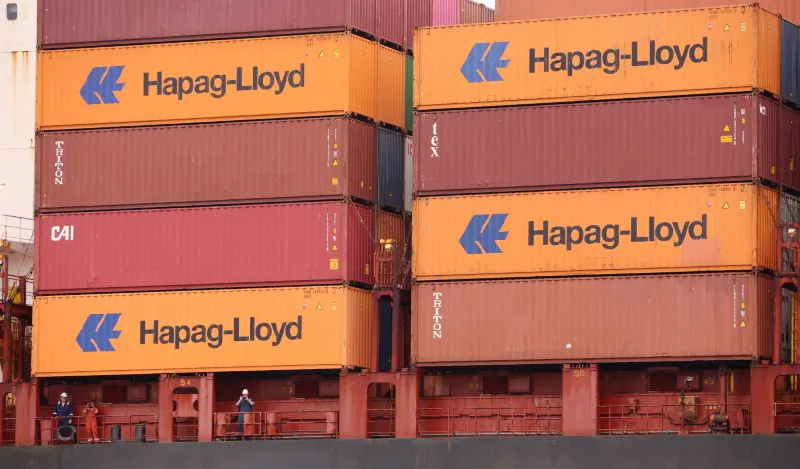One of the world’s largest international shipping companies, Hapag-Lloyd, is continuing to avoid sending shipments through the Red Sea even as the international community is stepping up efforts to guard commercial ships against recent attacks.
Earlier this month, Hapag-Lloyd and Maersk both paused traffic through the Red Sea after their vessels had come under drone and missile attacks launched from areas of Yemen controlled by the Houthi rebel movement. The two major international shipping companies subsequently began rerouting shipments around the Cape of Good Hope, sending them the long way around Africa to avoid additional attacks.
Last week, the U.S. Department of Defense launched a new multilateral Red Sea maritime security mission dubbed Operation Prosperity Guardian. By Christmas Day, Maersk had announced plans to resume its Red Sea shipments, but as of Dec. 27 Hapag-Lloyd was still taking the added precaution of avoiding the Red Sea shipping lanes altogether.
“We deem the situation still dangerous and will re-route via the cape while re-assessing the situation day by day,” a spokesperson for the company told NTD News in an emailed statement. “We are talking about terrorism and we want to be safe for our crews, our vessels, and the cargo of our customers.”
Houthi attacks in the Red Sea and adjoining Gulf of Aden have continued even after the U.S. military announced its new Red Sea security partnership. On Tuesday, a spokesman for the Houthi movement’s armed wing claimed the Yemeni rebel group was responsible for a missile attack that targeted the Mediterranean Shipping Company container ship MSC United as it approached the southern end of the Red Sea.
Houthi Threat Persists
The Houthis, also known as Ansar Allah, are a Zaydi Shiite movement that has intermittently fought with Yemen’s internationally recognized government since 2004.
The conflict expanded after the Houthis took over the Yemeni capital of Sanaa in September 2014, bringing on a civil war that has seen Saudi Arabia and other Gulf states intervene on behalf of the Yemeni government. They are also widely believed to be backed by Iran, with the Trump administration designating the Houthis as a terrorist group in its closing days before the Biden administration reversed the designation shortly thereafter.
While the Yemeni civil war has died down in recent months with efforts at a ceasefire in Yemen, the Houthi movement has shifted its focus toward the ongoing fighting in the Gaza Strip between the Israeli military and the Hamas terrorist group. The Houthi rebel forces have launched multiple drone and missile attacks toward Israel, and have begun to attack Israel-linked merchant vessels in the Red Sea, in solidarity with Hamas.
Houthi fighters executed a helicopter-borne assault on the Bahamas-flagged cargo ship MV Galaxy Leader on Nov. 20, hijacking the ship in the Red Sea and taking its 25 crew members hostage. In December, the Houthis claimed responsibility for launching a missile that hit the Norwegian-flagged tanker ship Strinda, which reportedly caused a fire but no casualties.
In addition to targeting the MSC United, the Houthis claimed to have launched drone and missile attacks targeting the Israeli Red Sea port city of Eilat on Tuesday.
The U.S. Central Command (CENTCOM) said a U.S. destroyer and F/A-18 Super Hornets launched by the Eisenhower Carrier Strike Group shot down 12 suspected Houthi one-way attack drones, three anti-ship ballistic missiles, and two land attack cruise missiles launched from Yemen over a 10-hour period on Tuesday.
The U.S.-led effort to protect international shipping under Operation Prosperity Guardian is still taking shape. Some countries have elected to continue pre-existing maritime security efforts in the region rather than placing their personnel and naval assets under the authority of a U.S.-led operation. As of last week, Australia, Norway, the Netherlands, and Denmark had offered to send a handful of personnel to assist Operation Prosperity Guardian but had not pledged any additional warships to assist in the effort.
The continued Houthi threat poses a potentially significant disruption to global shipping. Between 10 and 15 percent of global shipping flows through the Red Sea.

